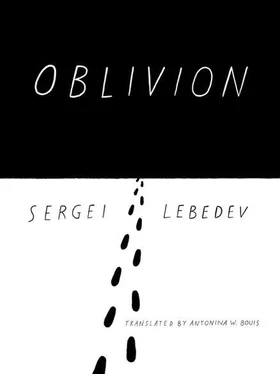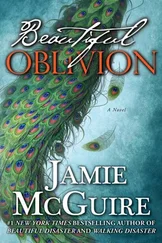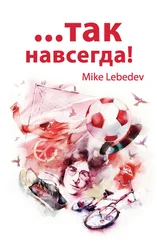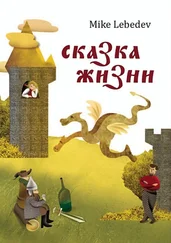Time passed, and I understood that as an adult I would not find anything in the apartment; everything that was visible I had examined, and not a single object replied to my silent question. Going through the closets, methodically opening drawers and boxes, searching—the very thought made me want to wash my hands, scald them with hot water until they turned red, until they burned. I had to return my childhood perception—I had spent a lot of time in Grandfather II’s rooms—go through the paths of that perception, which drew its own map of the apartment in sensual relief, to notice which objects remained themselves and which ones were slightly blurry, shimmering iridescently, showing that something was hidden inside; remember which corners, dark spaces behind furniture, and secret places behind the drapes called to me; the answer was there somewhere, in the past, in the view I once had from my height as a child.
I lay down on the couch, this position equalizes adult and child; a spring poked my side through the cushion; I lay there a long time, twilight came, the velvet curtains softening the light, and soon the room was dusky, so dark that I could not tell the color of the dark blue vase; the color was gone as if the vase was the usual glass dipped in water. I was getting sleepy but the couch spring, no matter how I turned, bothered me, poking my body, not letting me relax, not letting me sleep. I felt that something was missing and I wound the clock—an old alarm clock with an arc between two nickel-plated bells, resembling a snail that had a clock face instead of a shell. The clock started up, it had a special sound, a tinny dry click, which made me think as a child that it was counting its own separate time, the time of coming events that no one except Grandfather II was supposed to know about. Now it all came together, the clock, the blue twilight, the spring in my side, and I remembered how once I caught a cold visiting my parents, and they left me to spend the night at Grandfather II’s; I lay on this very couch, covered with two blankets, and I couldn’t fall asleep, the clock and spring kept me in the brittle space of half-awake and half-asleep, the room had already undergone the nighttime transformation, it was inhabited with shadows swaying like underwater grasses, and the objects had huddled in the corners, vaguely rising from the darkness; shadows and corners—the room turned into the combination of dozens of blurred templates, alternating stripes of curved and straight lines; its volume decreased, it contracted from a cube into a sphere, movable, breathing, like the lungs seen from inside.
I recalled how Grandfather II walked through the room that night; he suffered from insomnia—it was only in his dreams that he could see things that went beyond the framework of memory, but he slept badly, went to the kitchen for a glass of water, then a second and third, trying to fill some hole in himself, and only then slept, full of water, bloated like a bedbug; blind, he moved like a sleepwalker, reading the apartment by touch, and I thought that he might forget himself during these nocturnal walks, remembering that he was not always alone when he was awake, and do something that he would not do in the daytime; open a door, get something he did not want seen. And this time I was right: on the way back—the faucet was still dripping in the kitchen—Grandfather II came over, tucked in my blanket, and checked with his hand whether I was asleep; the corners of the eyes are relaxed when a person is sleeping, while they are tense in an awake person who shuts his eyes, and he knew the places to touch lightly to see if someone was asleep; I truly was dozing, I was almost asleep, almost no longer felt my body which had grown alien and heavy, like winter clothing. Having ascertained that I was asleep, Grandfather II went to his room.
He started bustling in there; if I had risked getting up and stepping on the floor, Grandfather II would have heard me immediately; but he had not shut the door and I could see what was going on in the big mirror of the chiffonier opposite the door; Grandfather II opened the top drawer of his desk and rummaged in it.
I knew that drawer; a child remembers every area where he is not allowed and tries to figure out ways of getting in; that drawer was always locked, it had a special lock, unlike the others in the desk, and I never saw a key on Grandfather II’s key chain that might fit it. I had tried pushing in a heavy fishing line to move the things inside and guess what was there from the sound; I shined my flashlight through the keyhole, I studied whether I could remove the screws and take out a side of the drawer; all in vain.
Grandfather II closed the drawer; the key was in his hand but he made a fist and I didn’t get a look at it; Grandfather II got in bed—where had he put the key!—and that was the end of the incident in the night; in the morning I found a moment to look around his room, but I couldn’t see where he could hide the key.
Now two decades later, my old interest in the drawer was the hottest clue I had recalled; I went to the desk and tugged lightly at the drawer. I expected it to be locked, but it submitted to the tug with a creak; the apartment must have been examined for valuables more than once over twenty years.
In the drawer was a bundle of well-worn letters tied with a colorful ribbon, probably tied by a woman, a box of pen nibs, and a few razor blades for removing ink splotches and errors; a calendar with an announcement of elections to the Supreme Soviet of the USSR and a round candy tin filled with paper fasteners; there was a smaller tin, for caviar, which held teeth, with crowns and without, canines, incisors, wisdom teeth—the dental history of Grandfather II’s life; he must have collected them out of some strange whim, a madman’s eccentricity—something like a belief that you have to show up at the Final Judgment with all your bones, turn yourself in with all thirty-two teeth accounted for; but even the gold and steel of the crowns could not connect these teeth in the box with a human image—they seemed to belong to some animal like a wolf or dog; strong-boned, powerful, big, that had passed many other animals, fat and skinny, it didn’t matter, through its jaws; a magnitude—a mathematical magnitude—of the consumed flickered before me when I looked at those teeth; a long line of living creatures eaten so that the jaws could swallow another one.
Grandfather II had saved his canines and incisors as if preparing for a new life where they would come in handy. In the same box, wrapped in wax paper, were my milk teeth, tiny, pathetic, like those of a puppy or fox kit; I wanted to throw them away instantly, there was something nasty in the existence of a part of myself that was separate from me; I was engulfed by the old, forgotten sensation that he was following an instinct and collecting everything that could bring me closer to him, everything through which he could own me, literally and figuratively; the answer to why, or rather the start of the path to the answer, was somewhere here in this drawer; I sensed it as I went through Grandfather II’s pagan amulets.
His dental bridges were there, too—pink plastic with smooth ceramic teeth and a special powder to clean them. There were four pieces—Grandfather II started losing his teeth early, either because of some long-ago starvation and his exhausted organism, or because his body was matching his desire to appear to be a little old man, a lisping, gray granddad with teeth-in-a-glass. Grandfather II, he was a grandfather, a mighty word charged with a radical power, traded his body for the signs of aging, even though he was in good health, and it helped him, let him hide behind age, although not completely.
The false teeth, the elderly lifestyle, the insistent use of baby words—puddy cat, yumyum porridge, jammies; walking stick, medication schedule, milk toast instead of soup—all a mask to fool people and cunning to fool death, self-deprecation, marked impotence; here I am, I’m blind, harmless, and weak, I am like a bug in Your hand, do not squash me, Lord. But he wasn’t a bug, he was a scorpion sleeping under a cold damp rock on a hot day; the drawer, which gave off a sharp smell of turpentine and furniture shellac as chilling as the touch of a centipede’s legs, seemed to be a den of toxic creatures, they had hidden and run off, but the sense that they had been there remained; I knew that feeling from Central Asia, where the deceptively pleasant air always carried the presence of the sun’s stinger, the cheery crippling poison dissolved in it, the bite always near.
Читать дальше












